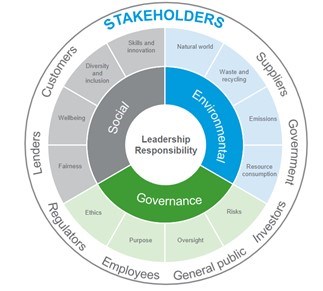ESG is for every business

ESG is fast becoming business critical and a license to operate for all businesses with Leadership Responsibility at their heart.
Our diagram explains some of the key concepts of ESG that will help you to join the debate.
ESG refers to three core pillars of business conduct:
- Environment - How a business interacts with and impacts the environment
- Social - How a business interacts with society and gives something back
- Governance - How an organisation is governed

Stakeholders
Putting sustainable and responsible practices at the heart of your business is fast becoming a requirement and expectation for customers, clients, regulators, investors, and other stakeholders.
Customers, both B2B and B2C, may reject businesses with poor practices (e.g poor human rights in supply chains), or a perception of unsustainable/unsafe products. Conversely, customers will look favourably on those who are able to demonstrate their commitment to improving every aspect of ESG.
ESG extends past an organisation's direct impact and considers where the environmental and social issues are across the whole value chain. Passing the buck to a third party is therefore not an option for any business that wants to truly demonstrate good ESG credentials.
In prominent sectors for the Midlands economy, such as manufacturing and construction, companies have started to consider ESG in their business practices and when bringing products to the market. For example, reducing their carbon footprint, using renewable, sustainable materials and considering the human rights and treatment of workers along each step of the supply chain.
Many businesses are focused on the ‘E' of ESG but tend to pay less attention to the ‘S' and the ‘G'. With the environmental damage some high emitting organisations cause, this is not surprising. Climate change is high on the news agenda and can't be ignored, however it's important to also be alert to what customers demand. Consumers are becoming more aware of the societal impact and ethical purpose of the companies they spend money with.
If business practices such as pay, ethics and treatment of staff are questionable, they will vote with their feet, as demonstrated by the fall-out from the recent P&O Ferries redundancies. The damaging media coverage is also clear to see. Consumers can have long memories, and once a company has been shown to be unethical, the lost revenue and reputational damage can be catastrophic.
Businesses that don't take ESG strategy and reporting requirements seriously may struggle to secure investment in future. For example, many private equity investors are signed up to the ‘Principles of Responsible Investment' and this is leading to downward pressure for their portfolio businesses to develop their own targets and track performance.
Businesses are also coming under increasing pressure from their own workforces to implement ESG strategies. Failure to act runs the risk of disenchantment and increased attrition as employees choose to work for organisations that clearly demonstrate credible commitment to this approach.
Key focus for mid-market businesses in the Midlands
The sheer breadth of ESG as a subject can make it difficult to begin to grapple with. Businesses often ask us, “Where do we start?” Understanding the key topics that are most important to your business can help direct efforts to the areas where you can have the most impact.
Top tips
- Baseline assessment - really understand what your organisation already does in this area. You may be surprised by what you find out about your organisation.
- Consider what makes for a sensible strategy and policy approach given the context of your business.
- Identify the gaps - assess what is missing in your current approach versus where you want to get to. Plan out the steps needed to get you to where you want to be.
- Develop a continuous improvement mindset - ESG is a business mindset, not a tick box exercise.
The soon you start on your ESG journey, the sooner you will be well placed to maximise on the opportunities good ESG can bring for your customers, your team and other stakeholders in your business.
For further information about how RSM UK can help your business contact regional managing partner Mark Taylor mark.taylor@rsmuk.com or call 07841 974994.
Pictured: Mark Taylor, regional managing partner at RSM
